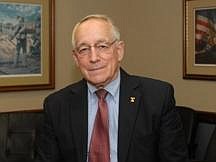Rhea County became famous in 1925 when three regulars at the F.E. Robinson Drug Store - the local manager of Cumberland Coal Co., the superintendent of schools and attorney Sue K. Hicks - planned a trial that would give the county seat, Dayton, much needed publicity.
The threesome recruited 24-year-old John T. Scopes, a substitute biology teacher, to admit to teaching the theory of evolution. The "drugstore conspirators" thus engineered a case that would test the constitutionality of the Butler Act, recently passed by the Tennessee Legislature.
The act prohibited the teaching of evolution in any state-funded school even though Tennessee required teachers to use a textbook endorsing evolution.
Attorneys Sue Hicks and his brother Herbert Hicks formed the original prosecution team in the Scopes trial. Sue was the youngest child of Charles Wesley, a prominent Madisonville lawyer, and Susanna Coltharp Hicks. His father named the infant in honor of his mother, who died a few days after childbirth.
Responding to an advertisement by the ACLU for a challenge to the Butler Act, Sue Hicks played a leading role in a trial that pitted modernists, who said evolution was not inconsistent with religion, against fundamentalists, who said the word of God as revealed in the Bible took priority over all human knowledge.
The trial gained national prominence. Well-known lawyers came to represent each side. Clarence Darrow, the famed defense attorney, headed the team for Scopes. William Jennings Bryan, three-time presidential candidate, became special prosecutor, relegating the Hicks brothers to secondary roles.
The trial lasted 10 days. A carnival atmosphere developed as supporters for the opposing sides expressed themselves with signs, sermons, psalms and trained chimpanzees on the courthouse lawn and nearby streets, which were lined with hotdog stands.
More than 200 reporters, including two from London, England, arrived. A number depicted Dayton as backward. The satirical H.L. Mencken of the Baltimore Sun called Bryan a "buffoon," the defense "eloquent" and "magnificent" and the jury "hot for Genesis." He described local citizens as "hill-billies" and "yokels" but found "the country town full of charm and even beauty" and Rhea County priding itself on a kind of tolerance.
Most of the expert evidence on evolution planned by the defense was excluded by Circuit Judge John Raulston but was heard outside the presence of the jury and later used as an appellate record for review. In the end the Tennessee Supreme Court upheld the constitutionality of the Butler Act but dismissed the case on a technicality - the $100 fine Judge Raulston imposed on Scopes was illegal because state law required that all fines in excess of $50 levied against a defendant be set by a jury.
Although attorney Sue Hicks played a relatively small role in the Scopes trial, he later gained additional recognition and a measure of notoriety.
Shel Silverstein, noted cartoonist, author, poet, songwriter, playwright of children's stories and cartoonist for Playboy Magazine, composed "A Boy Named Sue," which Johnny Cash recorded. Silverstein was said to have gotten the idea for the tune when he attended a judicial conference in Gatlinburg, Tenn., where he heard Judge Sue Hicks speak.
Cash said he was unaware that Silverstein had any one person in mind in writing the song but sent Hicks two records and two autographed pictures with the inscription, "To Sue, how do you do." The song won a Grammy Award in 1970.
Sue Hicks served as circuit judge in Tennessee from 1936 to 1958 and thereafter as a senior judge. He was proud of the fact that he had tried more than 800 murder cases as a judge but lamented that "the most publicity has been from the name Sue and the evolution case." He commended Judge John T. Raulston for his role but found the frenzy of the crowd almost beyond control.
In the mid-1960s as president of the Fort Loudon Association, he led the early opposition to TVA's plans to build the Tellico Dam at the mouth of the Little Tennessee River in the snail darter controversy.
Hicks died on June 17, 1980, at age 84 and was buried in Sweetwater, Tenn. Interest in the trial continues today. For the 24th year, the Gem Players of Etowah sponsors through today a showing of "Inherit the Wind," a fictionalized account of the Scopes trial that stars Spencer Tracy, Frederic March and Gene Kelly.
Jerry Summers is an attorney at Summers, Rodgers and Rufolo. Frank (Mickey) Robbins, an investment adviser at Patten and Patten, contributed to this article. For more visit chattahistoricalassoc.org.

